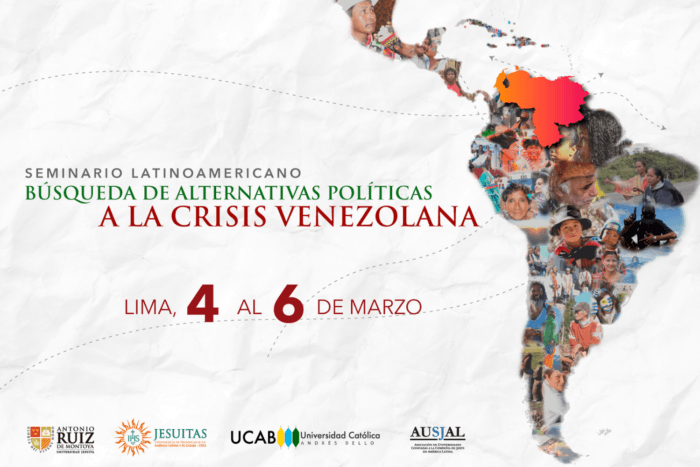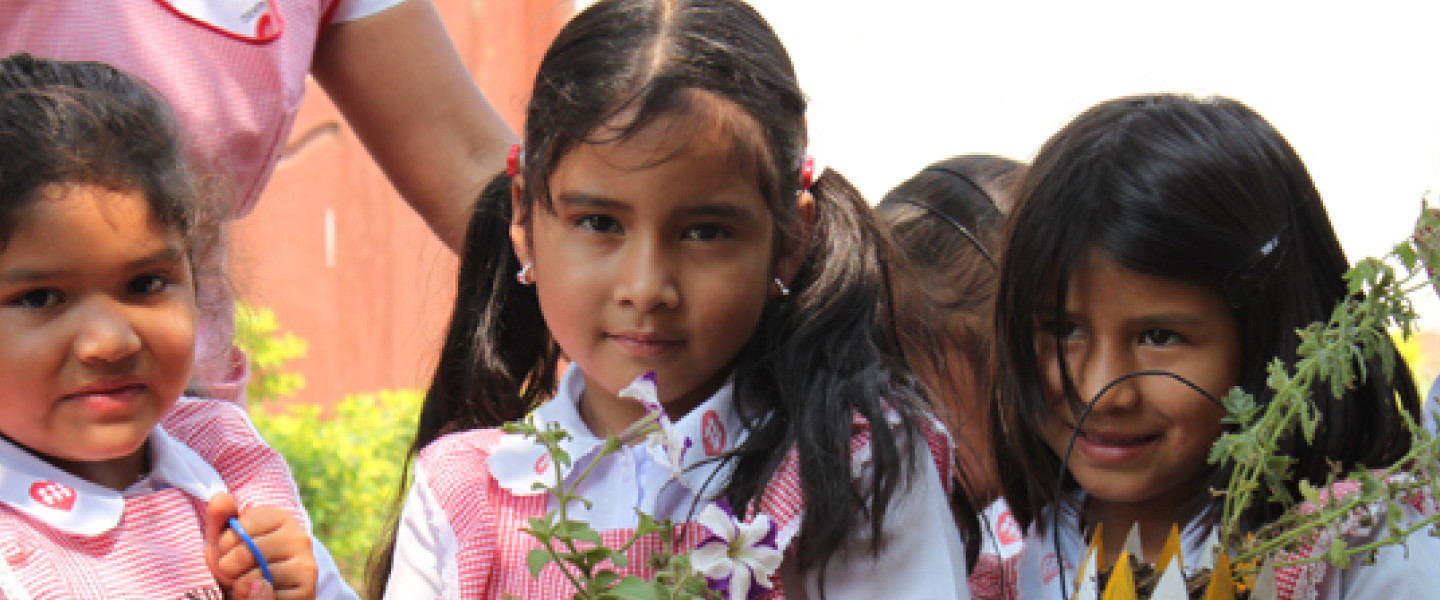
As servants of Christ’s mission in Latin America and the Caribbean, from March 4-6, 51 lay people and priests, including 19 Jesuits, from various professional and academic sectors gathered to discuss political solutions to the crisis in Venezuela. We were convened by the Conference of Jesuit Provincials of Latin America and the Caribbean (CPAL) and received support from the Antonio Ruiz de Montoya University in Lima and the Andrés Bello Catholic University in Caracas.
Our main task throughout the seminar was to clarify the principal factors contributing to the crisis currently facing Venezuela — a crisis which affects all of Venezuelan society, but in particular those who are most impoverished. Deliberations focused on three main questions: What role do the various social, political, and military actors play in the Venezuelan context? What is the position of the countries and transnational power blocs with the most influence over the crisis? What should the contribution of the Society of Jesus be and what is the best course of action given the various likely scenarios?
We are both saddened and challenged by the growing pain and misery of the Venezuelan people inside and outside the country. While we are aware that the factors that have led to the demise of democracy and living conditions in Venezuela are nothing new, the current destitution and breakdown of democratic institutions are morally intolerable and politically unsustainable. The millions of Venezuelans who have migrated to nearly all parts of Latin American (13 percent of the total Venezuelan population) give us a glimpse into the daily, almost unbearable suffering of the majority of the population. They are a people who are hungry, with nowhere to seek medical care, and deprived of basic public services. Still, they continue to survive despite the pitifully small salaries they receive. They suffer under various forms of social and political control, including persecution for protesting, at the hands of an increasingly totalitarian government whose legitimacy is now in question. They live in a state co- opted by a small group of private interests that is guilty of flagrantly squandering the country’s wealth.
We reaffirm the exercise of our mission of service through the Church. We share the position of the bishops of Venezuela who have personal knowledge of the tragedy unfolding in the country and the suffering of the people and assert that “we live under a de facto regime that does not respect the guarantees enshrined in the Constitution and in the highest principles of the dignity of the people … In this political, social, and economic crisis, the National Assembly, elected freely and democratically by the Venezuelan people, is currently the only body of government that has the legitimacy to exercise its sovereign powers” (111th Plenary Assembly of the Venezuelan Bishops’ Conference, January 2019).
The “Formula of the Institute,” which captures the original experience and inspiration of Ignatius Loyola, states that, among other reasons, the Society of Jesus was founded for the purpose of “reconciling those who are in conflict.” We are called to be messengers of hope and reconciliation in justice. “To do this, we must enter into a deeper understanding of the mystery of evil in the world and the transforming power of the merciful gaze of God who labors to create of humanity one reconciled, peaceful family” (36th General Congregation of the Society of Jesus, Decree 1, 31). For this reason, we do not solely dwell on the evils, but also rejoice in the many signs of solidarity and generosity among the Venezuelan people and our fellow brothers and sisters, for they have nurtured the struggle as well as the peaceful and active resistance by the victims and survivors in our fellow country.
Moved with compassion in the face of so much suffering and armed with a thorough analysis of the political, social, economic, and geopolitical factors impacting a political solution to the current crisis in Venezuela, the Jesuits put forward the following proposal:
to collectively promote political solutions and responses that preserve the centrality and inalienable dignity of every human being. We therefore reject all violations of human rights and any manipulation of political power in order to impose a system that fails to recognize dissent, pluralism, the collective rights of indigenous peoples, and the civil and political freedoms enshrined in the 1999 Bolivarian Constitution;
in the name of solidarity, to increase the support and attention we provide to Venezuelan migrants in our respective countries, not only because we recognize the tragedy of their circumstances, but also because we appreciate their presence and the rich contribution they make to the societies that welcome them;
to promote in various ways an ever more thorough and complete understanding of the Venezuelan reality through research, publication, outreach, teaching, and formation through our various apostolic services, with the purpose of diminishing the effects of misinformation, prejudice, and polarization and instead fostering genuine solidarity.
We are grateful to the international community for its interest and efforts to assist the Venezuelan people in overcoming this crisis. We believe in and defend the fundamental principle of self-determination for all people of the world. We therefore affirm that in its quest to correct the current evil in Venezuela, outside pressure does not in fact worsen the suffering of the people. Ethically speaking, it is neither right nor good to fight one evil with another that may lead to increased misery, exclusion, and exploitation of the Venezuelan people, especially of the poor and defenseless.
As Pope Francis told Jesuits at the closing of the 36th General Congregation in November 2016, we are convinced that “the Society of Jesus is not called to occupy spaces, but to spark processes.” This seminar was a beautiful example of this type of service.
We pray to the Lord our God for all those who are a part of the apostolic body of the Society of Jesus in Venezuela, as well as for all those who accompany, advocate, promote, and work for the integration of migrants in different countries of our region. “Even in moments where we confront huge challenges and apparent defeats, we continue to dream of contributing to the creation of a different world for we have known ‘he who is able to do immeasurably more than all we ask or imagine,’ (Ephesians 3:20). For this reason, we maintain our “feet fitted with the readiness that comes from the gospel of peace” (Ephesians 6:15). (Message of prayer for those Jesuits working in conflict and war zones, 36th General Congregation.)
On behalf of the participants,
Roberto Jaramillo Bernal, S.J.
President of CPAL
Source: CPAL
Download press release here [English | Spanish]
